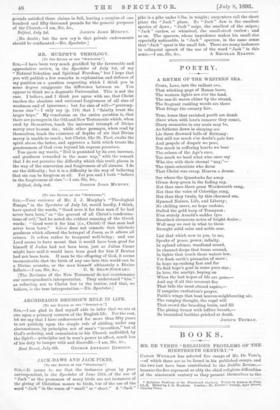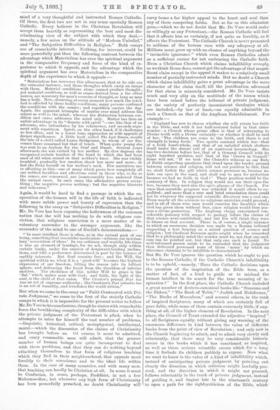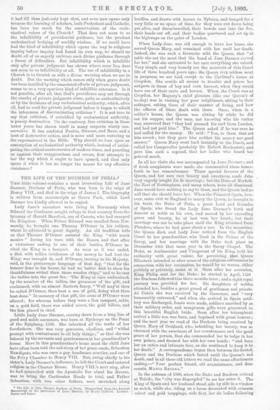BOOKS.
MR. DE VERB'S "RELIGIOUS PROBLEMS OF THE. NINETEENTH CENTURY."* CANON WENHAX has selected five essays of Mr. De Vero's, —of which three are to be found in his published essays, and the two last have been contributed to the Dublin Review,— because the five represent so ably the chief religious difficulties of the nineteenth century as they present themselves to the • Rezigiow Problems of the Nineteenth Century. Mgmys by Aubrey de Vero, LL.D. Edited by J. G. Wombs= London, St. Ancelm'c Society, Agar Street, Charing Cross. mind of a very thoughtful and instructed Roman Catholic.
Of these, the first two are not in any sense specially Roman Catholic. Every believer in the Christian Revelation will accept them heartily as representing the best and most dis- criminating view of the subject with which they deal,— namely, a few notes on the attitude of "Modem Unbelief," and "The Subjective Difficulties in Religion." Both essays are of remarkable interest. Nothing, for interest, could be more powerfully put than the following contrast between the advantage which Materialism has over the spiritual argument in the comparative frequency and force of the kind of ex- perience to which it appeals, and the advantage which the spiritual argument has over Materialism in the comparative depth of the experience to which it appeals :— "Materialism has moreover this allurement, that at its side are the reiterated instances, and those thoughts which carry an image with thorn. Material conditions alone cannot produce thought ; yet material conditions, as well as causes derived from a far other source, are necessary for man's exercise of thought, so long as man has a body. Now, observing at every moment how much the intel- lect is affected by these bodily conditions, many persons confound the conditions with the causes ; and repetition carries the day. Again, the apparent triumphs of matter over mind address the senses as well as the mind ; whereas the distinction between con- dition and cause addresses the mind only. Matter has thus an unfair advantage in its "dispute with spirit "—one like that of an advocate, who intimidates by his vehemence, and seconds argu- ment with repetition. Spirit, on the other hand, if it challenges us less often, and in a lower tone, approaches us with appeals of deeper significance. A little book called The Lost Senses, recalls the tale of a child called Laura Bridgeman, to whom of our five senses there remained but that of touch. When quite young she was sent to an Asylum for the Deaf and Dumb. Several years afterwards she was visited by her mother. By slow degrees she recognised certain touches of the hand to which she had been used of old when seated on that mother's knee. She was visibly troubled ; gradually her emotion shook her more and more ; at last she flung herself on her mother's neck. Few narratives are so affecting as this—one of many which prove how completely all our noblest faculties and affections exist in those who, so far as the senses are concerned, are immeasurably less endowed than the animal races. In such cases the affirmative proves every- thing; the negative proves nothing ; but the negative blusters and reiterates."
Again, it would be hard to find a passage in which the co- operation of the human will in the life of faith is indicated with more subtle power and beauty of expression than the following in the essay on "Subjective Difficulties in Religion." Mr. De Vere has been exposing the hollowness of the common notion that the will has nothing to do with religious con- viction, that religious conviction is a mere matter of in- voluntary surrender to the stronger argument, like the surrender of the mind to one of Euclid's demonstrations :— "In mere intellect there is often, as in the animal part of our being, something that resembles mechanism—witness our involun- tary association of ideas.' In our ordinary and worldly life there is also an element of bondage, for we act, though only within certain limits, under the 61.10.81011 of downward-tending inclina- tions, and with a preference determined in part by the balance of earthly interests. But Soul remains free ; and the Will, the spiritual within us, when it is a ' good-will ' becomes the highest expression of our freedom, lifting the reason into its loftiest sphere, and delivering the heart from the thraldom of inferior motives. The obedience of this nobler Will to grace is the 'fiat' which unites man with God; and faith, the light of the soul, is the child of that union. The Creator's primal Fiat lux was an act of supreme authority ; the Creature's Fiat voluntas tua is an act of humility, and irradiates the world within."
But when we come to the essay on" Faith Contrasted with Pri- vate Judgment," we come to the first of the strictly Catholic essays in which it is impossible for the present writer to follow Mr. De Vere to his conclusions, though he states with remarkable force the bewildering complexity of the difficulties with which the private judgment of the Protestant is plied, when he attempts to solve for himself the vast number of problems, —linguistic, historical, critical, metaphysical, intellectual, moral,—which the discussion of the claims of Christianity has brought before us. Of course, it must be admitted, and every reasonable man will admit, that the greater number of human beings are quite incompetent to deal with these problems, and that they can do nothing beyond attaching themselves to that form of religious teaching which they find in their neighbourhood, that appeals most forcibly to their conscience and to the ideal life within them. In the case of many countries, and with many men, that teaching can hardly be Christian at all. In some it must be Confucian, in some, perhaps, Buddhist, in not a. few Mahommedan ; but wherever any high form of Christianity has been powerfully preached, no doubt Christianity will carry home a far higher appeal to the heart and soul than any of these competing faiths. But so far as this admission goes,—which we do not doubt that Mr. De Yore would make as willingly as any Protestant,—the Roman Catholic will feel that it affects him as certainly, if not quite as forcibly, as it affects the Protestant. The Catholic Church is never presented to millions of the human race with any adequacy at all. Millions must grow up with no chance of anything beyond the "invincible ignorance" which even Roman Catholics admit as a sufficient excuse for not embracing the Catholic faith. Even a Christian Church which claims infallibility wrongly, as we think Rome does, cannot get the advantage of that magni- ficent claim except in the appeal it makes to a relatively small number of partially instructed minds. But no doubt a Church which claims infallibility gains a. great advantage in the mere character of the claim itself, till the justification advanced for that claim is minutely considered. Mr. De Yore insists much and very ably on the multitude of the issues which have been raised before the tribunal of private judgment, on the variety of perfectly inconsistent theologies which are included,—by law at least,—as equally admissible in such a Church as that of the Anglican Establishment. For example :— "England has now to choose whether she will retain her faith in the Bible, and with it her half-restored belief in that sister wonder—a Church whose prime office is that of witnessing to Divine truth with a Divine certainty—or whether it shall be said of her, The children are come to the birth, and there is not strength to bring forth.' Two spirits contend within her—that of a faith heart-whole, and that of an unbelief which shelters itself under the decent veil of an equivocal terminology. She has two decisions before her, that of a General Council with its eight hundred prelates, and that of the Crown in Council.' Some will ask, If we took the Church's witness as our Rule of Faith respecting questions that stand upon the border ground between science and religion, will not our position be this, that we shall forfeit the gift which science promises us, because we hide our eyes in the sand, and shall run to man for protection because we had no faith in God P' Their position would be the contrary of this. In religion they would not use their eyes the less, because they used also the optic glasses of the Church. For once that scientific progress was retarded it would often be ex- pedited; and more than a rare and brief retardation there could not be wherever the supposed scientific discovery was a real one. From nearly all the sciences no religious anxieties could proceed ; and in all of them wise men would exercise the faculties which God has given them without fear, since religion would then pos- sess a divine protection. The Anglican clergy entertained con- siderable jealousy with respect to geology before the claims of that science were established ; and but few will think they were to blame on that account. There is, of course, a single instance in which an erroneous decision was made by a Roman tribunal respecting a text bearing on a mixed question of science and religion ; but Cardinal Newman spoke aright when he remarked that to a philosophic mind the wonder must be, not that one such case can be pointed out, but that only one such is found. No well-informed person needs to be reminded that the judgment then delivered possessed none of those 'notes' by which an utterance claiming to be infallible in characterised."
But Mr. De Yere ignores the question which he ought to put to the Roman Catholic, if the Catholic Church's infallibility is to be upheld,—namely, Have the Catholic decisions upon the question of the inspiration of the Bible been, as a matter of fact, of a kind to guide or to mislead the human intellect in its search for the true meaning of in- spiration P' In the first place, the Catholic Church included a great number of deutero-canonical books like "Susanna and the Elders," "The Book of Tobit," "Judith and Holofernes," "The Books of Maccabees," and several others, in the rank of inspired Scriptures, many of which are certainly full of pure fable, while some of them contain extremely little, if any- thing at all, of the higher element of Revelation. In the next place, the Council of Trent extended the adjective " inspired " to all Scriptures equally, without giving any warning of the enormous difference in kind between the value of different books from the point of view of Revelation ; and only now is the Church beginning to admit, and to admit very slowly and reluctantly, that there may be very considerable historic errors in the books which it has sanctioned as inspired, as well as those serious scientific errors which for a long time it forbade its children publicly to expose. Now what we want to know is the value of a kind of infallibility which, instead of anticipating private judgment by pointing out clearly the direction in which criticism might lawfully pro- ceed, and the direction in which it might not proceed, follows reluctantly in the track of private judgment, instead of guiding it, and begins late in the nineteenth century to open a path for the righbeeriticism of the Bible, which it had till then jealously kept shut, and even now opens only because the learning of scholars, both Protestant and Catholic, has been too much for the conservatism of the eccle- siastical rulers of the Church? That does not seem to us the infallibility of providential guidance, but the prudent ecclesiastical hedging of worldly wisdom, If we could have had the kind of infallibility which opens the way to religious inquiry before inquiry had found its own way, we should no doubt all of us eagerly embrace such divine guidance through a forest of difficulties. But infallibility which is infallible only after private judgment has shown where error lies, does not seem to us infallibility at all. The use of infallibility in a 4011Urell is to furnish us with a divine warning when we are in doubt. But the warning which comes only when grave doubt has been instilled by the unassisted efforts of private judgment, seems to us a very spurious kind of infallible utterance. Is it not possible, after all, that God's providence may act through the results of private judgment alone, quite as authoritatively as by the decisions of any ecclesiastical authority, which, after all, had to wait for private judgment before it began to admit the inferences of discriminating criticism ? It is not true to say that criticism, if unbridled by ecclesiastical authority, is purely destructive. On the contrary, free criticism in these latter years has shown itself in many respects wisely con- servative. It has confuted Paulus, Strauss, and Baur, and a host of destructive critics, and is more and more restoring us the supernatural in the Bible. Why should we lean upon an assumption of ecclesiastical authority which, instead of antici- pating the critical controversies of modern times, and guarding us against their exaggerations and errors, first attempts to bar the way which it ought to have opened, and then only opens it when it has no longer the means for any effective resistance




































 Previous page
Previous page